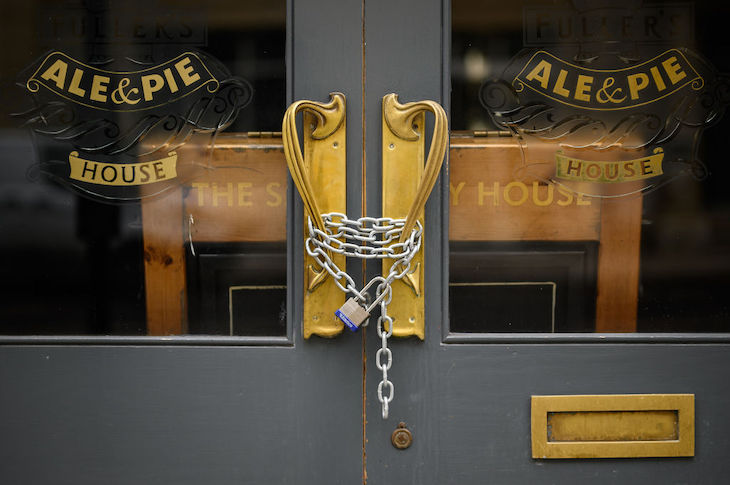It is just after tea-time on Budget day, and my pub is already half-empty. A few hours ago, Rachel Reeves stood up and, in the name of ‘fiscal responsibility’, drove the final nail into what remains of Britain’s hospitality industry. By failing to address the devastation that Labour’s decision to hike employers’ National Insurance did to pubs, restaurants and hotels, it could be game over for hundreds of beloved locals.
Reevesageddon is not just a Budget. It is a requiem. Raise one last pint while you still can
There was little in the way of good news for us publicans in the Budget, but there was plenty to make us worry. Alcohol duty will rise in line with inflation, making the cost of a pint – already too much for many drinkers – even greater. The rise in the minimum wage, by 8.5 per cent to £10.85 an hour from April for some young workers, is an ill thought out gesture that will make it harder for pubs to keep going.
This Budget adds strain to pubs already afflicted by the £25 billion raid on employers’ National Insurance in Reeves’ 2024 Budget. For an industry running on 3–5 per cent profit margins, the carnage is well under way.
In the thirteen months since that disastrous first Labour Budget, more than tens of thousands of jobs have been lost in hospitality. Four in five businesses have put prices up, more than half have cut staff or hours, and the trade body UK Hospitality now warns that thousands more pubs and restaurants will not see 2026. Vague promises in the Budget of ‘greater freedoms’ for councils under a new National Licensing Policy to support pubs and late-night venues won’t undo the damage.
This isn’t the first time that Labour had done its best to wreck our world famous pub industry. When New Labour swept to power in 1997, one of their very first acts – before Iraq, before the Dome, before the peerages-for-loans scandal – was to make the ancient custom of the tronc (the pot for tips) almost unworkable. Tips, they decreed, could no longer count towards the minimum wage; the full rate had to be paid from the till, accompanied by a Himalayan range of new paperwork. Thousands of waiting jobs effectively vanished overnight.
The Licensing Act 2003 followed, promising continental ‘café culture’ – Tony Blair’s own phrase – but delivering instead a blizzard of forms, fees and local authority vetoes. Then came the smoking ban of 2007, which emptied the public bar and filled the gutters with shivering clusters in winter coats. Some 11,000 pubs closed in the decade that followed.
History, as they say, rhymes. Almost the first whisper from Sir Keir Starmer’s administration was the threatened ban on smoking in beer gardens – a policy so unpopular that even Labour MPs begged the leadership to drop it. Next came the Employment (Allocation of Tips) Act, finally enforced under this government, which mandates that 100 per cent of service charge goes to staff but buries operators under yet more red tape.
And then there have been the various Budget measures. These make it clear that the Labour government sees businesses like mine as a piggy bank it can raid as it pleases.
So why this peculiar, persistent animus against the pub? Is it class loathing? The answer lies in the DNA of the Labour movement. Keir Hardie, its sainted founder, was a lifelong teetotaller who proudly declared that ‘Labour and liquor don’t mix’. Raised in the evangelical hothouse of Lanarkshire, he campaigned for local vetoes on licences and saw the public house as a capitalist device to keep the workers debauched and docile. That nonconformist, chapel-bred disdain for ‘the demon drink’ never really left the party. Is it class loathing? The oikish English working class, with their raucous laughter and unrefined pints, has always offended the sensibilities of Labour’s bien-pensant elite.
It survived secularisation, survived New Labour’s champagne socialism, and now endures in the spreadsheet puritanism of Rachel Reeves. Different vocabulary, but the same impulse: the English working class must be improved, disciplined, civilised – saved from itself.
The pub – loud, unashamed, occasionally vomiting in the taxi rank – is the last civic space where hierarchy dissolves in ale. That is why it has always terrified the improving classes, from Methodist preachers to modern management consultants.
Thankfully, the Chancellor has not yet outlawed alcohol; she will simply make it too expensive to serve profitably. As I turn the lights down tonight, the ghosts of Hardie and his abstemious heirs must be raising a glass of water in satisfaction. Reevesageddon is not just a Budget. It is a requiem. Raise one last pint while you still can.







Comments